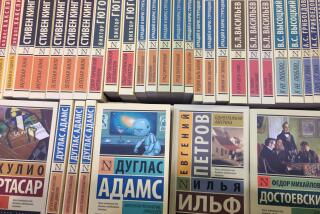U.S., Soviet Women on Sexuality : Americans Find a Lack of <i> Glasnost</i>
- Share via
MOSCOW — Fifteen American women who spent a week with some of their Soviet counterparts this month say they found that glasnost has its limits when it comes to such intimate topics as birth control and abortion.
Even so, the advent of greater candor, as advocated by Soviet leader Mikhail S. Gorbachev, clearly influenced their discussions. As a result, the Americans came away with a deeper appreciation of the problems encountered by their Soviet sisters in such everyday chores as shopping as well as such issues as contraception.
The visit by the 15 Americans was arranged by the U.S.-U.S.S.R. Youth Exchange Program of San Francisco in an effort to promote understanding among women aged 15 to 70.
Shortages of Contraceptives
Their discussions took place at a high level--they hiked and camped for two weeks in the Tienshan mountains in Kazakhstan, not far from the Chinese border, at an altitude of 7,150 feet.
The Americans spoke about their experiences in separate interviews after ending their tour last week.
“Living together, climbing together tends to open people up,” said Colette Shulman, a senior staff associate for Columbia University’s School of International Affairs. “We had the best discussions I ever heard about sexual responsibility and sexuality.”
Other American women said they were startled by what they heard about the shortages of contraceptives in the Soviet Union, not to mention the absence of sanitary napkins and tampons.
Soviet women’s frequent use of abortion as a method of birth control also raised American eyebrows.
But they found that the Soviet women, brought up in a more traditional and even prudish society, were reluctant to discuss such matters in detail.
“One 24-year-old woman told us she knew nothing about sex until her husband told her in their bedroom,” said Kelly Inman, 27, an accountant from Frazier Park, Calif.
Overall, most of the Soviet women who attended were “very skillfully evasive” and “wouldn’t give us straight answers,” on these issues, she concluded.
Lottie Shackleford, first black mayor of Little Rock, Ark., who took part in the discussions, said there was real resistance to group discussions of birth control and abortion issues.
Anne Cahn, director of the Washington-based Committee for National Security, said American women find it much easier to confide in one another, even in groups.
“Life is extremely hard for Soviet women,” she said. “There are no supermarkets, no real conveniences, not even sanitary napkins.
“They keep children to themselves longer because they are very protective, but it makes the mother’s life more difficult,” she added. “And they get much less help from husbands than comparable American women do.”
Colette Shulman said she found Soviet women were reluctant to consider men as full and responsible family partners.
“Women feel child-raising is their responsibility,” she said. “It may be an after-effect of World War II when men were few, men were precious, men were coddled.”
Elizabeth Taylor, executive director of two private foundations in Washington, said she felt that even Soviet citizens who were excited about a new openness in public life also were not sure where the limits were.
“I am going to walk away with new questions, too,” she said.
More to Read
Sign up for Essential California
The most important California stories and recommendations in your inbox every morning.
You may occasionally receive promotional content from the Los Angeles Times.













